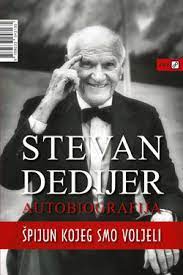Difference between revisions of "Steven Dedijer"
(unstub) |
(nationality) |
||
| Line 3: | Line 3: | ||
|amazon= | |amazon= | ||
|historycommons= | |historycommons= | ||
| + | |nationality=Serbian,Yugoslav,US? | ||
|spartacus= | |spartacus= | ||
|image=Stevan Dedijer.jpg | |image=Stevan Dedijer.jpg | ||
Revision as of 23:54, 9 December 2021
(academic, spook) | |
|---|---|
 | |
| Born | 1911-06-25 Sarajevo, Condominium of Bosnia and Herzegovina, Austria-Hungary |
| Died | 2004-06-13 (Age 92) Dubrovnik, Croatia |
| Nationality | Serbian, Yugoslav, US? |
| Alma mater | Collegio Internazionale Monte Mario, Taft School, Princeton University |
Stevan Dedijer was a Yugoslav academic and a pioneer of Business Intelligence,[1] the strategies and technologies used by enterprises for the data analysis of business information.
Life
Stevan Dedijer was born in Sarajevo, Bosnia and Herzegovina to Milica Dedijer and Jefto Dedijer. Dedijer spent much of his early childhood on the run. His father belonged to the inner circle of the Black Hand, the Serbian organisation behind the assassination of Archduke Franz Ferdinand II.[1]
He attended secondary school in Rome, Italy, and graduated from the Taft School in Watertown, Connecticut, in 1930. He earned a degree in physics at Princeton University in 1934. He worked as a journalist in Pittsburgh and New York City, editing a Serbian-language communist newspaper, and later, after World War II in Yugoslavia.
At the start of the second world war, Dedijer joined the Office of Strategic Services (OSS), the forerunner of the CIA. His communist sympathies and earlier cooperation with the NKVD, the KGB's forerunner, meant he did not last long. [2]
Dedijer then served in the American army as a paratrooper in The 101st Airborne Division from 1942 to 1945. He deployed into Bastogne during the Battle of the Bulge from December 1944 through January 1945.
Dedijer's brother Vladimir Dedijer fought for Tito's Partisans, and was Tito's biographer after the war.
In 1949 Stevan Dedijer returned to Belgrade as a researcher at the Belgrade Nuclear Institute. From 1952 to 1955 he was director of the Institute, though from 1954 he was gradually removed from Yugoslav political positions and he found his work conditions deteriorating throughout the later 1950s.[3]
Given leave to leave Yugoslavia in 1961, Dedijer spent a year at the Niels Bohr Institute in Denmark before moving to Sweden. He was awarded a Honorary PhD from the University of Lund in Sweden, and after a short time at Lund University's Physics Department founded the Research Policy Institute at the University.[3]
Dedijer's research focus was on Business Intelligence and he has been named the grandfather of business intelligence by his friend, the late CIA Director William Colby.[citation needed]
Dedijer was the first person in Europe to teach business/competitive intelligence at a university.[4] He was a co-founder of the Swedish Intelligence Network BISNES (Business Intelligence & Strategy Network Scandinavia) together with his Ph.D student Hans Hedin and the Swedish Intelligence firm Docere Intelligence AB.
Stevan Dedijer was awarded the SCIP Meritorious Award for his services in this field.
During the war in Kosovo, Dedijer lived in Dubrovnik and befriended Lieutenant Colonel Randolph Hampton, US Army who had spent nearly 45 months in the Balkans. LTC Hampton was in Dubrovnik as part of an advance party which would deploy into Kosovo for post war operations.[citation needed] During those months, Dedijer would meet LTC Hampton and review not only his years with the 101st ABN Division, but the historical, political and social ramifications of the war in the Balkans. LTC Hampton and Cathrine Andersen, a Norwegian OSCE human rights representative, hosted Dedijer's 88th birthday at the Marco Polo Restaurant in Old Town Dubrovnik.
Stevan Dedijer died at his home in Dubrovnik, Croatia.
References
- ↑ Jump up to: a b https://www.theguardian.com/news/2004/sep/01/guardianobituaries.obituaries
- ↑ Haynes, John (2000). Venona: Decoding Soviet Espionage in America. New Haven, Connecticut: Yale University Press. ISBN 978-0300077711.
- ↑ Jump up to: a b https://books.google.com/books?id=1LmuCwAAQBAJ&pg=PA2
- ↑ Hans Hedin (1993) 'Business Intelligence in Sweden', Competitive Intelligence Review, Volume 4, Issue 2-3, pages 71–72, Summer-Autumn (Fall) 1993.
Wikipedia is not affiliated with Wikispooks. Original page source here